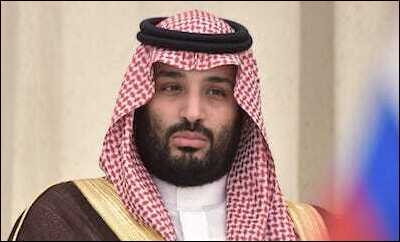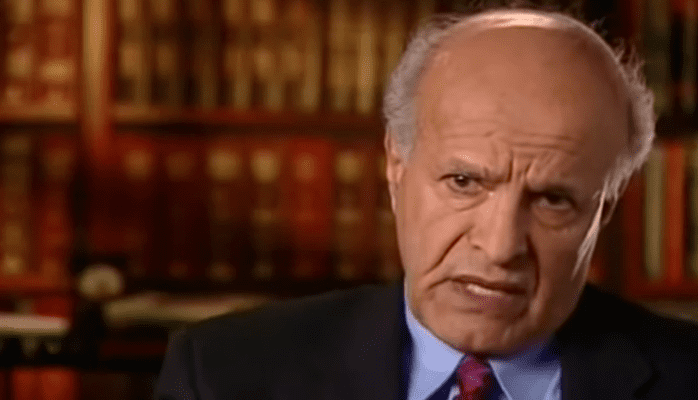Ali Alyami, founder of the Washington, DC-based Center for Democracy and Human Rights in Saudi Arabia, spoke to participants in a March 5 Middle East Forum webinar (video) about the circumstances surrounding Saudi Crown Prince Mohammed bin Salman’s (MbS) recent decision to remove his kingdom’s blockade against Qatar, which had been in place since 2017.
Although Qatar nominally gained its independence from Great Britain in 1971, Alyami said that it became truly independent when Emir Khalifa bin Hamad al Thani was overthrown by his son, Hamed al Thani in 1995.
Prior to this, Qatar was subservient to the Saudi-led Gulf Cooperation Council (GCC). The Saudis established the GCC in 1980 to “control the other Gulf States’ foreign policy, domestic policy, and natural resources.” The Gulf States resented the Saudis, who “dominated the scene for many, many years, … not only politically and economically, but also socially and religiously.”
 Qatari Emir Tamim bin Hamad al Thani Qatari Emir Tamim bin Hamad al Thani |
Emir Hamed al Thani adopted an independent foreign policy and expanded Qatar’s relations with regional powers outside the Gulf. Qatar’s independent streak grew further after Hamed passed power to his son, Tamim bin Hamad al Thani, in 2013. Regionally, Qatar benefits from its “very lucrative relationship with Iran … which is the most powerful country” in the Persian Gulf. Iran’s centuries old animosity with the Saudis makes “Qatar worthwhile for the Iranians” to protect and defend, said Alyami. Qatar also has close relations with Recep Tayyip Erdoğan’s Turkey, another rival of Saudi Arabia, which established a military base in the emirate. Qatar’s independent foreign policy was seen by the Emiratis and Saudis as a “betrayal of the GCC family interest.”
Qatar’s Al-Jazeera’s satellite television network, established in the 1990s, is another source of tensions with the Saudis. Many ordinary citizens in the Arab gulf states watch Al-Jazeera because it is “their only open forum to discuss their views and to expose their regimes’ failures at home,” which is why MbS saw it as a threat.
Qatar’s support for Hamas and the Muslim Brotherhood became a growing bone of contention with MbS. According to Ayami, Qatar’s support for the Brotherhood has less to do with supporting extremism or terrorism than with its fear of the Brotherhood’s power. It was originally invited into the emirate decades ago as a bulwark against the pan-Arab nationalist movement of the late Egyptian President Gamal Abdul Nasser. As teachers, businesspeople, medical professionals, and government officials, Brotherhood members became fully ensconced within Qatari society.
 Saudi Crown Prince Mohammed bin Salman. Saudi Crown Prince Mohammed bin Salman. |
This was a Faustian bargain, as the Muslim Brotherhood charter “is against rule by inheritance,” said Alyami, but it simply became too difficult for the Qataris to expel the movement. After Mohammed Morsi, the Muslim Brotherhood candidate for Egypt’s presidency, was elected in 2012, the Qataris were concerned that the Brotherhood “might become … leaders of all … Sunni Muslims” and strengthened ties with it accordingly.
This backdrop of historical tension set the stage for the Saudi blockade of Qatar in 2017. The Saudis and Emiratis initially planned to launch a military invasion of Qatar, but this was thwarted by U.S. Secretary of State Rex Tillerson and Secretary of Defense Jim Mattis because of the strategic importance of America’s Al Udeid Air Base in Qatar and their desire to maintain access to Qatar’s wealth in natural resources, especially its gas fields.
MbS imposed a host of conditions on Qatar for lifting the blockade, including shutting down Al Jazeera, downgrading diplomatic relations with Iran, and ending military cooperation with Turkey. However, Riyadh and Abu Dhabi were unable to persuade the rest of the Arab world to cut ties with Qatar. Notably, while Egypt is at odds with Qatar over its relations with the Muslim Brotherhood, it chose not to disconnect its financial ties with the emirate.
Even within the GCC there was a lack of enthusiasm for the blockade from ordinary people. Extensive tribal ties among Qatar and the other Gulf states mean that many of their citizens have relatives in Qatar, said Alyami. “My last name is Alyami, it’s a tribe in Saudi Arabia. There are lots of Alyamis, for example, in Qatar and Kuwait and Bahrain and everywhere else.”
The other Gulf States have generally regarded Saudi adventurism and MbS’s behavior as “reckless,” particularly his war in Yemen. Countries such as Oman and Kuwait feared they could also become targets and “started easing themselves out of the GCC union.”
Meanwhile, Qatar strengthened its ties with Iran and Turkey, which expanded its military base in the emirate. And its ties to the West remained as strong as ever. Qatar’s oil wealth enabled it to buy influence in Western universities and think tanks, and to strengthen its financial independence by investing in businesses throughout the international community.
| In the end, the blockade left Qatar stronger “domestically, regionally, and globally.” |
In the end, the blockade left Qatar stronger “domestically, regionally, and globally.” In contrast, MbS’s standing at home and abroad became weaker, and he feared the dispute with Qatar would be a liability as he moved toward normalization with Israel. Four years after imposing the blockade on Qatar, MbS ended it without any of his demands being met.
In closing, Alyami warned that America is in denial in its belief that the Arab gulf states are honest brokers in the fight against terrorism and extremism. Saudi Arabia has used its wealth to buy influence and improve its image in the United States, but it remains “the biggest creator of extremism and terrorism … in the Middle East and all over the world.”
This article has been adapted from its original source
Statements, comments or opinions published in this column are of those of the author(s) and do not necessarily reflect the editorial policy of Warsan magazine. Warsan reserves the right to moderate, publish or delete a post without prior consultation with the author(s). To publish your article or your advertisement contact our editorial team at: warsan54@gmail.com

